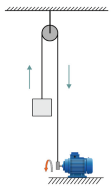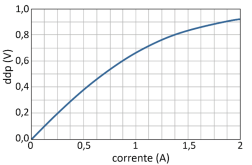Questões de Vestibular USP 2021 para Vestibular - Edital 2022
Foram encontradas 90 questões
A quantidade de bactérias em um líquido é diretamente proporcional à medida da turbidez desse líquido. O gráfico mostra, em escala logarítmica, o crescimento da turbidez x de um líquido ao longo do tempo t (medido em minutos), isto é, mostra log10x em função de t. Os dados foram coletados de 30 em 30 minutos, e uma curva de interpolação foi obtida para inferir valores intermediários.

Disponível em https://fankhauserblog.wordpress.com/.
Com base no gráfico, em quantas vezes a população de
bactérias aumentou, do instante t0 para o instante t1?

Fatbergs are a growing scourge infesting cities around the world— some are more than 800 feet long and weigh more than four humpback whales. These gross globs, which can cause sewer systems to block up and even overflow, have been plaguing the U.S., Great Britain and Australia for the past decade, forcing governments and utilities companies to send workers down into the sewers armed with water hoses, vacuums and scrapers with the unenviable task of prying them loose.
"It is hard not to think of [fatbergs] as a tangible symbol of the way we live now, the ultimate product of our disposable, out of sight, out of mind culture," wrote journalist Tim Adams in The Guardian.
At their core, fatbergs are the accumulation of oil and grease that's been poured down the drain, congealing around flushed nonbiological waste like tampons, condoms and baby wipes. When fat sticks to the side of sewage pipes, the wipes and other detritus get stuck, accumulating layer upon layer of gunk in a sort of slimy snowball effect.
Fatbergs also collect other kinds of debris—London fatbergs have been cracked open to reveal pens, false teeth and even watches.
Restaurants are a big contributor to fatbergs: Thames Water, the London utilities company, found nine out of 10 fast-food eateries lacked adequate grease traps to stop fat from entering the sewers. Homeowners also contribute to the problem by pouring grease and fat down the sink.
Even though its component materials are soft, fatbergs themselves can be tough as rocks. Researchers have found a host of dangerous bacteria in fatbergs, including listeria and e.coli.
Fatbergs are notorious for their fetid smell, which can make even the hardiest sewer workers gag, and chipping away at one can release noxious gases.
The key to fatberg prevention is remembering the four Ps: Pee, poo, puke and (toilet) paper are the only things that should be flushed.
Newsweek, 14 March, 2019. Adaptado.

Fatbergs are a growing scourge infesting cities around the world— some are more than 800 feet long and weigh more than four humpback whales. These gross globs, which can cause sewer systems to block up and even overflow, have been plaguing the U.S., Great Britain and Australia for the past decade, forcing governments and utilities companies to send workers down into the sewers armed with water hoses, vacuums and scrapers with the unenviable task of prying them loose.
"It is hard not to think of [fatbergs] as a tangible symbol of the way we live now, the ultimate product of our disposable, out of sight, out of mind culture," wrote journalist Tim Adams in The Guardian.
At their core, fatbergs are the accumulation of oil and grease that's been poured down the drain, congealing around flushed nonbiological waste like tampons, condoms and baby wipes. When fat sticks to the side of sewage pipes, the wipes and other detritus get stuck, accumulating layer upon layer of gunk in a sort of slimy snowball effect.
Fatbergs also collect other kinds of debris—London fatbergs have been cracked open to reveal pens, false teeth and even watches.
Restaurants are a big contributor to fatbergs: Thames Water, the London utilities company, found nine out of 10 fast-food eateries lacked adequate grease traps to stop fat from entering the sewers. Homeowners also contribute to the problem by pouring grease and fat down the sink.
Even though its component materials are soft, fatbergs themselves can be tough as rocks. Researchers have found a host of dangerous bacteria in fatbergs, including listeria and e.coli.
Fatbergs are notorious for their fetid smell, which can make even the hardiest sewer workers gag, and chipping away at one can release noxious gases.
The key to fatberg prevention is remembering the four Ps: Pee, poo, puke and (toilet) paper are the only things that should be flushed.
Newsweek, 14 March, 2019. Adaptado.

Fatbergs are a growing scourge infesting cities around the world— some are more than 800 feet long and weigh more than four humpback whales. These gross globs, which can cause sewer systems to block up and even overflow, have been plaguing the U.S., Great Britain and Australia for the past decade, forcing governments and utilities companies to send workers down into the sewers armed with water hoses, vacuums and scrapers with the unenviable task of prying them loose.
"It is hard not to think of [fatbergs] as a tangible symbol of the way we live now, the ultimate product of our disposable, out of sight, out of mind culture," wrote journalist Tim Adams in The Guardian.
At their core, fatbergs are the accumulation of oil and grease that's been poured down the drain, congealing around flushed nonbiological waste like tampons, condoms and baby wipes. When fat sticks to the side of sewage pipes, the wipes and other detritus get stuck, accumulating layer upon layer of gunk in a sort of slimy snowball effect.
Fatbergs also collect other kinds of debris—London fatbergs have been cracked open to reveal pens, false teeth and even watches.
Restaurants are a big contributor to fatbergs: Thames Water, the London utilities company, found nine out of 10 fast-food eateries lacked adequate grease traps to stop fat from entering the sewers. Homeowners also contribute to the problem by pouring grease and fat down the sink.
Even though its component materials are soft, fatbergs themselves can be tough as rocks. Researchers have found a host of dangerous bacteria in fatbergs, including listeria and e.coli.
Fatbergs are notorious for their fetid smell, which can make even the hardiest sewer workers gag, and chipping away at one can release noxious gases.
The key to fatberg prevention is remembering the four Ps: Pee, poo, puke and (toilet) paper are the only things that should be flushed.
Newsweek, 14 March, 2019. Adaptado.
If you take a look at my smartphone, you’ll know that I like to order out. But am I helping the small local businesses? You would think that if you own a restaurant you’d be thrilled to have an outsourced service that would take care of your delivery operations while leveraging their marketing might to expand your businesses’ brand. However, restaurant owners have complained of lack of quality control once their food goes out the door. They don’t like that the delivery people are the face of their product when it gets into the customer’s hand. Some of the delivery services have been accused of listing restaurants on their apps without the owners’ permission, and oftentimes publish menu items and prices that are incorrect or out of date.
But there is another reason why restaurant owners aren’t fond of delivery services. It’s the costs, which, for some, are becoming unsustainable. Even with the increased revenues from the delivery services, the fees wind up killing a restaurant’s margins to the extent that it’s at best marginally profitable. Therefore, some restaurants are pushing harder to drive orders from their own websites and offering special deals for customers that use their in-house delivery people.
The simple fact is that these delivery apps are here to stay. They are enormously popular and have significantly grown. I believe that restaurant owners that resist these apps are hurting their brands by missing out on potential customers. The good news is that the delivery platforms are not as evil as some would portray them. They have some skin in the game. They are competing against other services. They want their listed restaurants to profit. Maybe instead of fighting, the nation’s restaurant industry needs to proactively embrace the delivery service industry and figure out ways to profitably work together.
The Guardian. 02 December, 2020. Adaptado.
If you take a look at my smartphone, you’ll know that I like to order out. But am I helping the small local businesses? You would think that if you own a restaurant you’d be thrilled to have an outsourced service that would take care of your delivery operations while leveraging their marketing might to expand your businesses’ brand. However, restaurant owners have complained of lack of quality control once their food goes out the door. They don’t like that the delivery people are the face of their product when it gets into the customer’s hand. Some of the delivery services have been accused of listing restaurants on their apps without the owners’ permission, and oftentimes publish menu items and prices that are incorrect or out of date.
But there is another reason why restaurant owners aren’t fond of delivery services. It’s the costs, which, for some, are becoming unsustainable. Even with the increased revenues from the delivery services, the fees wind up killing a restaurant’s margins to the extent that it’s at best marginally profitable. Therefore, some restaurants are pushing harder to drive orders from their own websites and offering special deals for customers that use their in-house delivery people.
The simple fact is that these delivery apps are here to stay. They are enormously popular and have significantly grown. I believe that restaurant owners that resist these apps are hurting their brands by missing out on potential customers. The good news is that the delivery platforms are not as evil as some would portray them. They have some skin in the game. They are competing against other services. They want their listed restaurants to profit. Maybe instead of fighting, the nation’s restaurant industry needs to proactively embrace the delivery service industry and figure out ways to profitably work together.
The Guardian. 02 December, 2020. Adaptado.
If you take a look at my smartphone, you’ll know that I like to order out. But am I helping the small local businesses? You would think that if you own a restaurant you’d be thrilled to have an outsourced service that would take care of your delivery operations while leveraging their marketing might to expand your businesses’ brand. However, restaurant owners have complained of lack of quality control once their food goes out the door. They don’t like that the delivery people are the face of their product when it gets into the customer’s hand. Some of the delivery services have been accused of listing restaurants on their apps without the owners’ permission, and oftentimes publish menu items and prices that are incorrect or out of date.
But there is another reason why restaurant owners aren’t fond of delivery services. It’s the costs, which, for some, are becoming unsustainable. Even with the increased revenues from the delivery services, the fees wind up killing a restaurant’s margins to the extent that it’s at best marginally profitable. Therefore, some restaurants are pushing harder to drive orders from their own websites and offering special deals for customers that use their in-house delivery people.
The simple fact is that these delivery apps are here to stay. They are enormously popular and have significantly grown. I believe that restaurant owners that resist these apps are hurting their brands by missing out on potential customers. The good news is that the delivery platforms are not as evil as some would portray them. They have some skin in the game. They are competing against other services. They want their listed restaurants to profit. Maybe instead of fighting, the nation’s restaurant industry needs to proactively embrace the delivery service industry and figure out ways to profitably work together.
The Guardian. 02 December, 2020. Adaptado.
Lying, thinking
Last night
How to find my soul a home
Where water is not thirsty
And bread loaf is not stone
I came up with one thing
And I don't believe I'm wrong
That nobody,
But nobody
Can make it out here alone
Alone - Maya Angelou
Os versos do poema

Considerando os elementos visuais e verbais da figura, é
possível interpretar a fala da mulher como
Um bom café deve ser preparado a uma temperatura pouco acima de 80ºC. Para evitar queimaduras na boca, deve ser consumido a uma temperatura mais baixa. Uma xícara contém 60 mL de café a uma temperatura de 80ºC. Qual a quantidade de leite gelado (a uma temperatura de 5ºC) deve ser misturada ao café para que a temperatura final do café com leite seja de 65ºC?
Note e adote:
Considere que o calor específico e a densidade do café e do leite sejam idênticos.
Uma bola de bilhar vermelha está inicialmente em repouso a
40 cm de duas das bordas (lateral e superior da figura) de uma
mesa de bilhar, como mostra a figura. Uma bola branca de
mesma massa e tamanho é lançada em direção à vermelha
com velocidade  paralela à borda lateral.
paralela à borda lateral.
As duas bolas colidem e, algum tempo depois, a bola vermelha está prestes a cair na caçapa posicionada na junção das duas bordas. No mesmo instante, a bola branca toca a borda superior da mesa a uma distância d da bola vermelha, conforme figura.

O valor de d é aproximadamente:
Note e adote:
Despreze efeitos dissipativos (como deslizamentos com atrito) e considere a
colisão entre as bolas como sendo perfeitamente elástica.
Considere que o diâmetro das bolas seja muito menor que as distâncias
mencionadas e que não ocorram outras colisões intermediárias.
Considere a situação indicada na figura, em que um motor, com o auxílio de uma polia, ergue verticalmente uma caixa de massa 12 kg. A caixa contém materiais frágeis e deve ser erguida com velocidade constante. Qual é a magnitude da força vertical que o motor deve exercer para realizar a tarefa?

Note e adote:
Despreze efeitos de atrito.
Aceleração da gravidade: g = 10 m/s2
.
Dois fios muito longos transportam, cada um deles, uma corrente elétrica de intensidade I, conforme indicado na figura. Uma partícula de carga +Q, situada a uma distância R de cada um dos fios, move-se com velocidade constante ao longo da direção z.

O módulo e sentido da força magnética atuando sobre a carga devido ao campo magnético produzido pelos fios são dados por:
Note e adote:
O campo magnético produzido por um fio muito longo transportando uma
corrente de valor I tem módulo aproximadamente dado por μ0 I/2πr, sendo r a
distância do fio até o ponto e μ0 corresponde a constante de permeabilidade
magnética.
Um componente eletrônico tem curva característica mostrada no gráfico a seguir:

A resistência elétrica do componente na região em que ele se
comporta como um resistor ôhmico vale aproximadamente:
O canhão de Newton, esquematizado na figura, é um experimento mental imaginado por Isaac Newton para mostrar que sua lei da gravitação era universal. Disparando o canhão horizontalmente do alto de uma montanha, a bala cairia na Terra em virtude da força da gravidade. Com uma maior velocidade inicial, a bala iria mais longe antes de retornar à Terra. Com a velocidade certa, o projétil daria uma volta completa em torno da Terra, sempre “caindo” sob ação da gravidade, mas nunca alcançando a Terra. Newton concluiu que esse movimento orbital seria da mesma natureza do movimento da Lua em torno da Terra.

Qual deveria ser a velocidade inicial de um projétil lançado
horizontalmente do alto do Everest (a uma distância
aproximada de 6.400 km do centro da Terra) para colocá-lo
em órbita em torno da Terra?
Note e adote:
Despreze a resistência do ar.
Aceleração da gravidade: g = 10 m/s2
Note e adote:
O valor obtido, embora da ordem de magnitude correta, não é o mesmo calculado por estimativas mais precisas.
Uma mancha de petróleo com mais de 3000 km de extensão se espalhou por praias e manguezais da costa da região nordeste e parte do sudeste, atingindo áreas marinhas protegidas como o Parque Nacional Marinho de Abrolhos, um dos principais bancos de corais e berço de biodiversidade do Atlântico Sul. Desde que foi detectada pela primeira vez, no dia 30 de agosto de 2019, a mancha de petróleo atingiu cerca de 900 locais em mais de 127 municípios em 11 estados. A origem do petróleo está estimada em algum local a leste do litoral do estado de Pernambuco, distante, aproximadamente, 600 km da linha de costa.
Disponível em https://www.wwf.org.br/. 2019. Adaptado.
Com base em seus conhecimentos sobre o litoral brasileiro e as correntes marítimas superficiais que margeiam a costa, assinale a alternativa correta que aponta o fator que contribuiu para a dispersão do petróleo.
Eventos climáticos extremos marcaram este ano com vários exemplos no mundo, atingindo populações inteiras, tanto em ambientes rurais como urbanos. Dentre esses eventos, pode-se destacar as inundações na Alemanha no mês de julho, com regiões acometidas por fortes chuvas.

Área urbana de Schuld, Oeste da Alemanha, antes (à esquerda) e depois (à direita) da inundação de julho/2021. Disponível em https://www.dw.com/.
Um dos motivos que podem ser relacionados ao evento de
inundação da área destacada é: